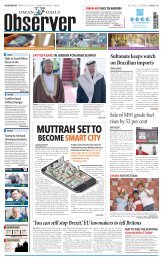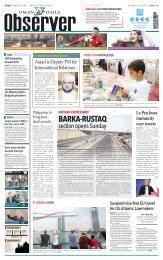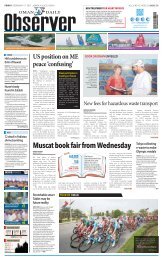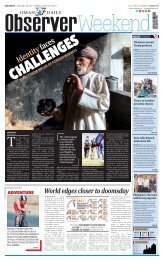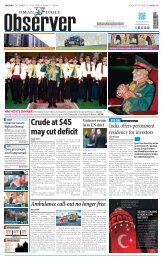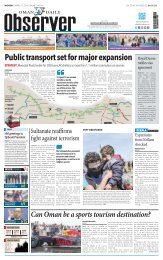GROWING
ICLt100AJRg
ICLt100AJRg
You also want an ePaper? Increase the reach of your titles
YUMPU automatically turns print PDFs into web optimized ePapers that Google loves.
ANALYSIS SS<br />
9<br />
SATURDAY l FEBRUARY 18 l 2017<br />
OMANDAILYOBSERVER<br />
Red blooms and warm glows at Pyongyang show<br />
A<br />
SEBASTIEN BERGER<br />
humble two-room hut nestles beneath snowladen<br />
trees, a warm red glow emerging from<br />
within, reminiscent of a Christmas Nativity.<br />
It is, according to North Korean orthodoxy,<br />
the mountainside birthplace of Kim Jong-<br />
Il, who inherited power from his father and<br />
passed it in turn to his son, current leader Kim<br />
Jong-Un.<br />
The image of the Day of the Shining Star, as<br />
the occasion is known, is a recurring motif at<br />
the Kimjongilia flower festival in Pyongyang,<br />
appearing in mosaics and models surrounded by<br />
the eponymous red blooms.<br />
Guide Ri Yun-I had no doubts. “The great<br />
leader general Kim Jong-Il was born in a secret<br />
camp on Mount Paektu,” she said — a volcano<br />
straddling the Chinese-Korean border seen as the<br />
spiritual birthplace of the Korean nation.<br />
Such origins would be appropriate for a man<br />
destined to lead the Democratic People’s Republic<br />
of Korea, as the North is officially known.<br />
“Our great general Kim Jong-Il devoted his<br />
whole life only for the prosperity of the country<br />
and our people’s happiness,” said Ri. “Our people<br />
Around 700,000 people<br />
are expected to cram<br />
into the exhibition hall<br />
in Pyongyang over<br />
seven days, and its<br />
passages were packed on<br />
Friday as soldiers and<br />
civilians made their way<br />
past the displays, many<br />
in jovial mood<br />
strongly miss him.”<br />
But outsiders beg to differ, pointing instead<br />
to Soviet records putting his place of birth as a<br />
Siberian village where his father was in exile, and<br />
a year earlier than Pyongyang’s 1942.<br />
Officially, it is 75 years since Kim Jong-Il was<br />
born, and the North is marking the anniversary<br />
with skating and synchronised swimming shows,<br />
fireworks and the flower festival — with no<br />
mention of the killing this week in Malaysia of<br />
Kim Jong-Nam, his first-born son and Kim Jong-<br />
Un’s half-brother.<br />
Around 700,000 people are expected to cram<br />
into the exhibition hall in Pyongyang over seven<br />
days, and its passages were packed on Friday as<br />
soldiers and civilians made their way past the<br />
displays, many in jovial mood.<br />
The Kimjongilia, a large begonia, was the<br />
unquestioned dominant feature, with 100,000<br />
potted blooms on show.<br />
Each stand was supplied by a different<br />
organisation or individual, ranging from the<br />
North’s central bank — whose stand featured a<br />
red map of a unified Korea, decked out in lights<br />
— to an 11-year-old schoolboy.<br />
Two stands held flowers presented in the<br />
names of overseas “friendship and solidarity”<br />
organisations or foreign embassies and leaders,<br />
with pride of place given to the President of the<br />
Syrian Arab Republic and the general secretary<br />
of the central committee of the Lao Peoples<br />
Revolutionary Party.<br />
“Our people cultivate very many Kimjongilias<br />
greeting the birthday of the great general Kim<br />
Jong-Il,” explained Ri.<br />
The flower was bred by Japanese botanist<br />
Kamo Mototeru, who Ri said “visited our country<br />
several times and he witnessed the reality of our<br />
country”.<br />
As a result he “admired the brilliance of<br />
General Kim Jong-Il” and so presented him with<br />
his creation.<br />
His father Kim Il-Sung had previously been<br />
honoured in 1965 with the Kimsungilia, a purple<br />
orchid named after him by Indonesian leader<br />
Sukarno.<br />
Kim Jong-Il died in 2011 and regular visitor<br />
Kim Nam-Hui said that he was “someone we all<br />
follow like our father and miss so much”.<br />
In the 29-year-old teacher’s opinion, the<br />
Kimjongilia is “the most beautiful flower in the<br />
world”.<br />
But, she said, “We come to this flower festival<br />
out of our longing for the general Kim Jong-Il and<br />
the longing for our nation, rather than because of<br />
the beauty of flowers.” — AFP<br />
In harmony with wildlife<br />
US President Donald Trump speaks during a press conference at the White House in Washington, DC.<br />
News media takes it on the chin again<br />
U<br />
GRETEL JOHNSTON<br />
S President Donald Trump held a news<br />
conference at the White House on Thursday<br />
in what the press corps had believed would<br />
be a routine announcement of his new<br />
choice to be labour secretary.<br />
Instead, it turned into a tour-de-force of<br />
his combative style, with the former reality<br />
television star hammering the media and<br />
championing his accomplishments as if he<br />
were still stumping on the campaign trail.<br />
After nearly four weeks in office Trump<br />
delivered an overwhelmingly positive selfcritique<br />
of his presidency thus far, in sharp<br />
contrast to criticism from all political camps<br />
except the Republican base and his ardent<br />
supporters.<br />
To hear him tell it, he has only been<br />
keeping promises he made to the American<br />
people.<br />
“There has never been a presidency<br />
that’s done so much in such a short period<br />
of time,” he crowed. “And we have not even<br />
started the big work yet.”<br />
Among the highlights he touted were<br />
announcements about jobs returning to<br />
the country, record highs on Wall Street<br />
and a tremendous surge of optimism in the<br />
business world.<br />
He cited a poll by Rasmussen putting his<br />
approval rating at 55 per cent — selecting<br />
the highest of three prominent polls, with<br />
the other two, Gallup and Pew Research,<br />
placing his approval rating at 40 per cent and<br />
39 per cent.<br />
At the same time he claimed he “inherited<br />
a mess” and ticked off a litany of problems<br />
both domestic and international.<br />
While reporters questioned the<br />
resignation of his national security adviser<br />
over his dealings with Russia and contacts<br />
his aides had with Russians during the<br />
campaign, Trump denied any involvement<br />
with Russia.<br />
His energy would go into fixing things,<br />
including relations with Russia: “We’re going<br />
to take care of it all,” he said.<br />
After US President<br />
Donald Trump’s first<br />
solo news conference, the<br />
US news media were left<br />
wondering where to start<br />
their summation of the<br />
77-minute Q&A. While<br />
picking up the pieces<br />
from the tongue-lashing<br />
they received, some<br />
asked whether it was the<br />
new normal<br />
Above all else in Trump’s almost streamof-consciousness<br />
pronouncements were his<br />
complaints about the “dishonest” and “out of<br />
control” media.<br />
He griped about the “tone” some<br />
television reporters used, a “nasty” story on<br />
the front page of the New York Times and<br />
the “hatred and venom” that he said flowed<br />
from a CNN broadcast in particular.<br />
“I sort of enjoy this back and forth — I<br />
guess I have all my life — but I’ve never<br />
seen more dishonest media than frankly, the<br />
political media,” Trump said.<br />
His election victory, he said, was thanks<br />
to his news conferences and speeches, not<br />
because voters listened to “you people,” he<br />
said, adding, “that’s for sure.”<br />
It was surprising that Trump for the<br />
first time as president opened the floor for<br />
what turned into a rollicking session, with<br />
reporters hands flying into the air, hoping to<br />
be called on, as they realised the president<br />
was ready to spar.<br />
Surprising because the day before<br />
during a joint news conference with Israeli<br />
Prime Minister Benjamin Netanyahu he<br />
ignored reporters from major newspapers<br />
and television networks, calling only on<br />
those who have been friendly to him.<br />
While much of what he said was<br />
familiar or taken straight out of his<br />
campaign handbook, he did give reporters<br />
something they hope for the most in such<br />
a setting: news.<br />
He said he would issue a new “executive<br />
action” next week, implying that it would<br />
be more narrowly tailored than the<br />
controversial January 27 executive order<br />
on immigration that has been halted by a<br />
court.<br />
Trump also said that an immigration<br />
programme to stop the deportation of<br />
people who arrived in the US as children,<br />
but never became legal immigrants, had<br />
been difficult for him, saying “we’re gonna<br />
show great heart.”<br />
The president who is so fond of using<br />
Twitter to bypass the media, told reporters<br />
he would let them ask him questions about<br />
his proposals because he liked to take his<br />
message “straight to the people.”<br />
And even with all the bashing, in his<br />
inimitable way, he said some reporters were<br />
“fantastic,” adding that he would make a<br />
good reporter himself. — dpa<br />
A<br />
HEAD OFFICE<br />
VISHAL GULATI<br />
nimals in the wild mostly avoid any encounters with humans — and when<br />
they do attack people, it is usually in self-defence, says legendary field<br />
biologist George Schaller.<br />
And it would be wrong to declare tigers and leopards that attack<br />
humans as “man-eaters”, Schaller, who believes he’s still young at 83, said.<br />
Thus, there is a need for training the communities settled on the<br />
periphery of wildlife parks and sanctuaries because the wild animals — be<br />
it the tiger or the leopard or the elephant — don’t want trouble from the<br />
humans, said Schaller.<br />
“And if a tiger is a man-eater, then its killing is certain,” he added.<br />
German-born Schaller, who devoted six decades to conservation of<br />
wildcats and their ecosystems, is currently the Vice-President of Panthera,<br />
an organisation founded in 2006 for conserving the animals.<br />
Schaller, who is wild at heart, said in India — a storehouse of biodiversity<br />
— development is a big issue.<br />
“India is saying it’s doing a lot for the preservation of wildlife. But it is<br />
really disturbing that 200 sq km of forest area of the Panna tiger reserve (in<br />
Madhya Pradesh) which is being diverted for non-forest purposes. After<br />
the 1990s, the country’s image in preserving forests is going down,” said<br />
the biologist-cum-author, who travelled to Central Africa to study the<br />
mountain gorilla when he was 25.<br />
It is greed and corruption that threaten nature more.<br />
The problem, in fact, across the globe is that oil, mining and timber<br />
companies are prepared to pay anything to operate in sensitive areas.<br />
Sadly, governments and officials succumb to their pressures.<br />
“I know people (supposed conservationists) who prefer to sit in their<br />
offices (rather than go into the field). Conservation has not to do only with<br />
animals. It also has to do with economics and politics.”<br />
Schaller, who has studied wildlife in several reserve forests and national<br />
parks in India, said the Jim Corbett National Park in Uttarakhand is the<br />
most vulnerable to poaching for international trade owing to its proximity<br />
to the Nepal border, a major trade link to the Chinese traditional medicine<br />
market.<br />
Estimates say India supports the highest population of tigers in the<br />
wild, accounting for 2,226 of the estimated 3,890 worldwide.<br />
Schaller, who has worked for nearly two decades on studying endemic<br />
wildlife in the Tibetan Plateau, said the snow leopard also needs protection<br />
from pastoral communities.<br />
“The Spiti Valley (in Himachal Pradesh) and the Hemis National Park<br />
(in Jammu and Kashmir) support a good population of the snow leopard,”<br />
said Schaller, who spent most of his time in the field in Asia, Africa and<br />
South America. — IANS<br />
Tel: 24649444, 24649450,<br />
24649451, 24604563, 24699437<br />
Fax: 24699643<br />
SALALAH OFFICE<br />
Tel: 23292633<br />
Fax: 23293909<br />
NIZWA OFFICE<br />
Tel: 25411099<br />
P.O. Box 955, P.C. 611<br />
Website: omanobserver.om<br />
ESTABLISHED ON 15 NOVEMBER 1981<br />
EDITOR-IN-CHIEF: Abdullah bin Salim al Shueili<br />
ADVERTISING<br />
AL OMANEYA ADVERTISING & PUBLIC RELATIONS, P.O. Box 3303,<br />
P.C. 112, Ruwi, Sultanate of Oman<br />
Tel: SWITCHBOARD: 24649444<br />
DIRECT: 24649430/24649437/24649401<br />
Fax: 24649434<br />
DISTRIBUTION AGENT<br />
Al OMANEYA for Distribution & Marketing, P.O. Box 974,<br />
P.C. 100, Muscat, Sultanate of Oman<br />
Tel: 24649351/24649360<br />
Fax: 24649379<br />
e-mail: editor@omanobserver.om<br />
PRINTED AND PUBLISHED BY: Oman Establishment for Press, Publication and Advertising<br />
P.O. Box 974, Postal Code 100, Muscat, Sultanate of Oman<br />
subscribe@omanobserver.om<br />
Disclaimer: The views and opinions expressed in this page are solely those of the authors and do not reflect the opinion of the Observer.



